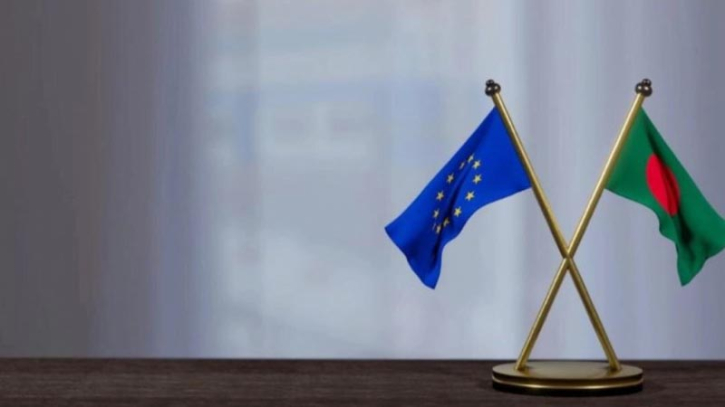Benefits of relocating EU visa centers from Delhi to Dhaka

On December 9, 2024, a 19-member European Union (EU) delegation, led by Michael Miller, Head of Delegation of the European Union to Bangladesh, met with Chief Adviser Professor Muhammad Yunus in Dhaka. Probably this is the first time in the history of Bangladesh that so many Ambassadors and representatives met with the head of the government collectively. During this meeting, Professor Yunus emphasized the need to relocate EU visa application centers from New Delhi to Dhaka, citing the logistical challenge in this regard- Bangladeshi citizens face due to India's visa restrictions.
While at first glance, it may seem like a one-sided interest from Bangladesh, this proposal presents significant opportunities for both Bangladesh and the EU, especially considering the expanding Bangladeshi diaspora in Europe and the growing number of students and workers seeking opportunities in the EU nations.
Relocating visa centers to Dhaka would greatly simplify the process, reducing financial barriers and bureaucratichurdles for Bangladeshi citizens. This move would facilitate legitimate travel for purposes such as education, employment, and tourism. Moreover, it would reflect a commitment by the EU to inclusivity and accessibility, ensuring that Bangladeshi applicants are not disadvantaged compared to those in other regions.
Recognizing the Expanding Bangladeshi Diaspora in Europe: A decade or two ago, only a handful of Bangladeshi citizens used to migrate to countries like Portugal, Estonia, Bulgaria and Romania. As a result, it was rational and cost-effective to maintain consular services in Delhi Embassies.
However, the Bangladeshi diaspora in Europe has witnessed substantial growth over the last decade. While traditional hubs like the United Kingdom and Italy host large communities, newer destinations such as Portugal, France, and Austria are becoming increasingly popular among Bangladeshi migrants. For instance:Portugal has seen an influx of Bangladeshi workers,with reports indicating over 25,000 Bangladeshis residing there as of 2024. France is home to a growing Bangladeshi population, particularly in urban centers like Paris. Austria, though traditionally not a major destination, has seen a notable rise in Bangladeshi migrants. Bangladeshi students are also going to Bulgaria popularly for medical studies. Educational migration to Lithuania has also surged drastically. In their host countries,the Bengali diaspora is contributing to sectors ranging from gastronomy to retail.
Supporting Educational Aspirations: Bangladeshi students are increasingly looking to EU countries for higher education, attracted by affordable tuition, quality programs, and post-study work opportunities. Besides traditional destinations in Western Europe, there is a noticeable rise in student migration to Eastern European nations. Bulgaria offers low tuition fees and scholarships in fields like engineering and medicine.Romanian universities are actively promoting programs in English, attracting Bangladeshi students.Lithuania and Estonia have become appealing due to their digital innovation and streamlined residence processes for international students.
In 2023 alone, over 52,000 Bangladeshi students pursued higher education abroad, with a significant portion heading to EU nations. Establishing visa centers in Dhaka would reduce barriers for these students, enabling them to access educational opportunities more easily. This would also benefit EU universities, which gain from the cultural and intellectual diversity that Bangladeshi students bring.
Strengthening EU's Soft Power: Relocating visa centers to Dhaka would demonstrate the EU's commitment to fostering strong international partnerships. Such a move would be seen as an acknowledgment of Bangladesh's growing importance as a partner, enhancing goodwill and diplomatic relations. Additionally, by making the visa process more accessible, the EU could further its objectives of cultural exchange and mutual understanding, thereby bolstering its soft power.
Bangladesh's strategic location and its position as one of the fastest-growing economies in SouthAsia make it a valuable ally for the EU. In this context, opening an embassy or establishing a resident office in Bangladesh would also help the respective country to engage more with Bangladesh.
The Role of Bangladesh's Foreign Ministry: To bring this proposal to materialization, the Ministry of Foreign Affairs (MoFA) must take proactive and effective steps. These include engaging in diplomatic dialogues with EU member states, presenting the logistical and economic benefits of relocating visa centers, and emphasizing the mutual advantages of stronger Bangladesh-EU ties. It also needs to reduce bureaucratic hurdles in this regard. Highlighting the growing diaspora and the increasing demand for educational and employment opportunities in the EU could further strengthen Bangladesh's objective.
Moreover, the ministry should consider hosting joint workshops or bilateral meetings with EU officials to outline the feasibility and benefits of the proposal and develop a framework to initiate the process as soon as possible. Bangladeshi embassies in Europe could also play a pivotal role in fast-tracking the process.
Relocating EU visa centers from New Delhi to Dhaka is a strategic move that offers significant benefits for both Bangladesh and the EU. For Bangladesh, it would address logistical challenges, support the aspirations of its citizens, and enhance its international standing. For the EU, it would reinforce its soft power, foster stronger ties with Bangladesh, and promote greater accessibility for Bangladeshi students, workers, and tourists.
Lastly, the onus now lies on Bangladesh's Foreign Ministry to leverage this opportunity and ensure swift implementation. By doing so, it would not only fulfill the Chief Adviser's vision but also mark a new chapter in Bangladesh-EU relations, characterized by mutual respect and shared progress. -Source: Daily Observer
.png)









